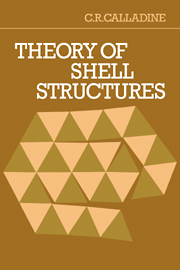Book contents
- Frontmatter
- Contents
- Preface
- List of symbols
- 1 Introduction
- 2 Generalised Hooke's law for an element of a shell
- 3 Cylindrical shells under symmetric loading
- 4 Purely ‘equilibrium’ solutions for shells: the membrane hypothesis
- 5 The geometry of curved surfaces
- 6 Geometry of distortion of curved surfaces
- 7 Displacements of elastic shells stressed according to the membrane hypothesis
- 8 Stretching and bending in cylindrical and nearly-cylindrical shells
- 9 Problems in the behaviour of cylindrical and nearly-cylindrical shells subjected to non-symmetric loading
- 10 Cylindrical shell roofs
- 11 Bending stresses in symmetrically-loaded shells of revolution
- 12 Flexibility of axisymmetric bellows under axial loading
- 13 Curved tubes and pipe-bends
- 14 Buckling of shells: classical analysis
- 15 Buckling of shells: non-classical analysis
- 16 The Brazier effect in the buckling of bent tubes
- 17 Vibration of cylindrical shells
- 18 Shell structures and the theory of plasticity
- Appendices
- 1 Theorems of structural mechanics
- 2 ‘Corresponding’ load and deflection variables
- 3 Rayleigh's principle
- 4 Orthogonal functions
- 5 Force-like and stress-like loads
- 6 The ‘static-geometric analogy’
- 7 The area of a spherical polygon
- 8 The ‘sagitta’ of an arc
- 9 Rigidity of polyhedral frames
- 10 Fourier series
- 11 Suggestions for further reading
- Answers to selected problems
- References
- Index
1 - Theorems of structural mechanics
Published online by Cambridge University Press: 02 February 2010
- Frontmatter
- Contents
- Preface
- List of symbols
- 1 Introduction
- 2 Generalised Hooke's law for an element of a shell
- 3 Cylindrical shells under symmetric loading
- 4 Purely ‘equilibrium’ solutions for shells: the membrane hypothesis
- 5 The geometry of curved surfaces
- 6 Geometry of distortion of curved surfaces
- 7 Displacements of elastic shells stressed according to the membrane hypothesis
- 8 Stretching and bending in cylindrical and nearly-cylindrical shells
- 9 Problems in the behaviour of cylindrical and nearly-cylindrical shells subjected to non-symmetric loading
- 10 Cylindrical shell roofs
- 11 Bending stresses in symmetrically-loaded shells of revolution
- 12 Flexibility of axisymmetric bellows under axial loading
- 13 Curved tubes and pipe-bends
- 14 Buckling of shells: classical analysis
- 15 Buckling of shells: non-classical analysis
- 16 The Brazier effect in the buckling of bent tubes
- 17 Vibration of cylindrical shells
- 18 Shell structures and the theory of plasticity
- Appendices
- 1 Theorems of structural mechanics
- 2 ‘Corresponding’ load and deflection variables
- 3 Rayleigh's principle
- 4 Orthogonal functions
- 5 Force-like and stress-like loads
- 6 The ‘static-geometric analogy’
- 7 The area of a spherical polygon
- 8 The ‘sagitta’ of an arc
- 9 Rigidity of polyhedral frames
- 10 Fourier series
- 11 Suggestions for further reading
- Answers to selected problems
- References
- Index
Summary
This appendix gives a brief sketch of various theorems in structural mechanics which are used in several parts of the book. These theorems apply to small deflections of elastic structures in the absence of buckling or other ‘geometrychange’ effects. In this appendix, for the sake of brevity and simplicity, they are described with reference to a simple plane pin-jointed truss which can be discussed in terms of a few, discrete, variables; but they can readily be translated into more general forms relevant to continuous structures (see appendix 2 on the idea of corresponding forces and displacements, etc.). The following description is restricted to frameworks whose members are made from weightless linear-elastic material, and which are stress-free in the initial configuration; but there is no difficulty in extending the scope of the theorems to include nonlinear elasticity and problems involving initial stress.
The description begins with the principle of virtual work, which makes a connection between the two distinct sets of conditions describing statical equilibrium and geometric compatibility of the various parts of the structure, respectively. This principle holds irrespective of the mechanical properties (or ‘constitutive law’) of the material from which the structure is made; and all of the various elastic theorems are derived directly from it by incorporation of the elastic material properties. (The theorems of the plastic theory of structures, which are used in chapter 18, are also derived directly from the principle of virtual work; but they are not proved here (see Calladine, 1969a).)
Information
- Type
- Chapter
- Information
- Theory of Shell Structures , pp. 711 - 720Publisher: Cambridge University PressPrint publication year: 1983
